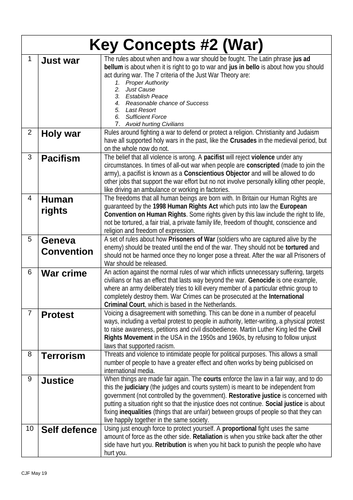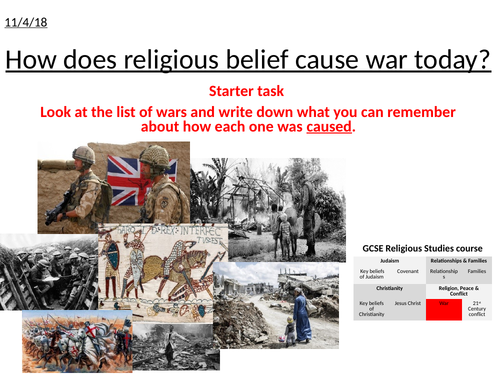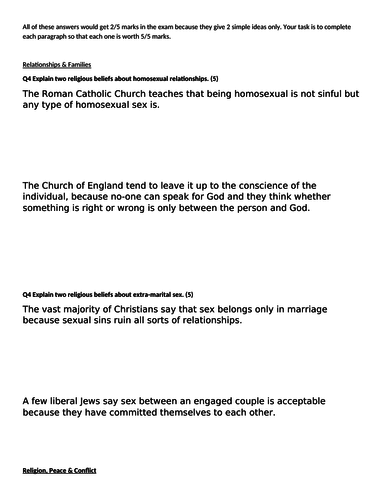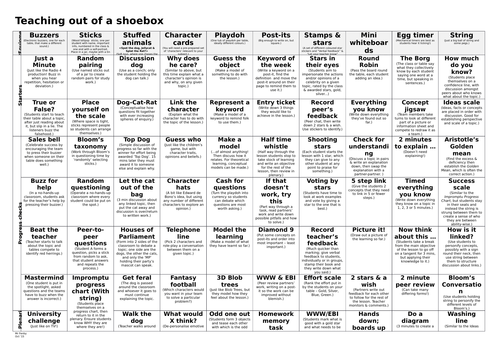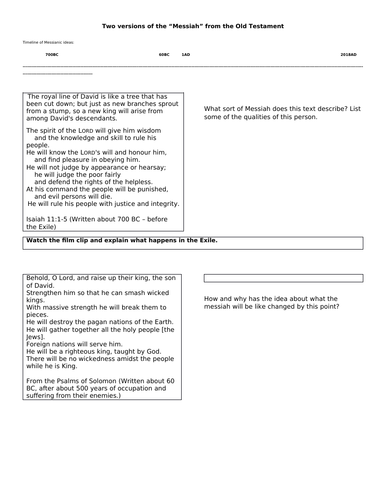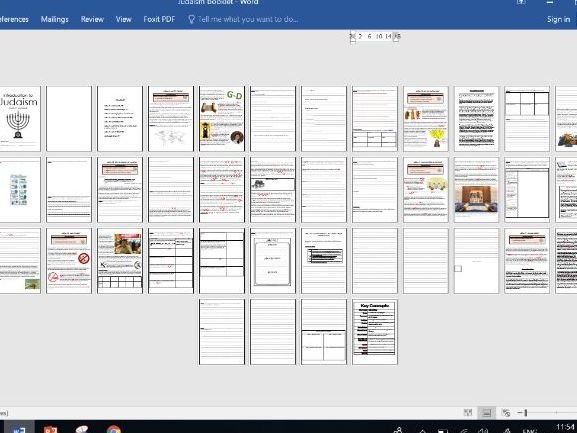
31Uploads
14k+Views
6k+Downloads
All resources

KS3 RE Buddhism workbook - fully resourced booklet self-study for lockdown absences etc
Here is a 6 lesson work booklet with 36 pages of quality learning, written for KS3. It is fully resourced and could be considered a self-study workbook.
This booklet has been a labour of love, its not something I knocked up quickly in a spare 10 mins - it has taken DAYS to put together and edit - I will be working through it with my KS3 classes but as its in a self-contained booklet style its also ready to take home and continue should we go into another lockdown. All tasks are “sit at your desk” type, there are no group work activities, in accordance with guidance for reopening schools in pandemic conditions.
Contents
Lesson #1: What were the Four Sights? p2
Lesson #2: What did the Buddha teach? p6
Lesson #3: What types of Buddhism are there? p13
Lesson #4: How do Buddhists worship and meditate? p20
Lesson #5: What is the ultimate goal of Buddhists? p25
Lesson #6: What is it like to be a Buddhist in the UK today? Assessment task p30
It is presented nicely, with pictures and variation in layout on every page. There are colour pictures but I’ve selected them on the basis of what will print well in black and white to save costs. There is one task on p28 that would benefit from having the artwork printed out larger, ideally in colour for students with sight issues, so that will download as a separate document for you. Each lesson includes reading, AO1 and AO2 tasks - the tasks are set out throughout each lesson with space to write the answers. There is an appendix at the back to provide challenge to that student whose parent emails in during lockdown saying the work you’ve set isn’t hard enough, or who finishes before the rest and needs an extension task to be working through.
There is a formative assessment point in lesson 2 and a summative assessment in lesson 6. Homeworks are built in on lessons 1, 3 & 5.Learning objectives are provided with each lesson, lesson titles are problematised. Cross curricular with Art, History, Geography, English (reading and poetry), IT (internet research) and everything else you’d expect for Religious Education. I have 15+ years’ experience as Head of RE and Head of Hums faculty - all the boxes are already ticked for you, this is a resource that you can send to your repro department for printing and then its good to go. 36 pages = fits to 9 x A3 sheets when printed back to back in an A4 booklet.
In summary, a unit of work on Buddhism that is all done for you and good to go. It has taken me most of this last week to put it together and edit it. It has been tested on my own daughter who is Y7, tasks timed and adapted accordingly so it makes sense to KS3 students if they are working alone.

AQA GCSE 9-1 Religious Studies unit Religion, Peace and Conflict Knowledge Organiser
Here are 2 x A4 cards with 10 x Key Concepts each and other information expanding on them. It can function as a Knowledge Organiser around revision time, or you can use them as homework memory tasks.
I have other sets of cards on TES for the units that make up the Short Course (Key beliefs of Christianity, Key beliefs of Judaism, Families and Relationships & Religion, Peace & Conflict).

KS3 work booklet on Prejudice & Discrimination 6 lessons, fully contained
This is a booklet I use with Y8 for lessons on Prejudice and Discrimination. To make life easy in coronavirus conditions I have turned my schemes into work booklets with everything they need for 6 lessons + homework contained within it.
This scheme of work has been in the making for years, and now helpfully organised into one resource. Each page has varied layout with pictures etc so that it can be printed out as an A3 folded/A4 workbooklet by your repro department.
Lesson 1 Where does extremism come from?
This explores the causes of extremism and terrorism, asks students to make judgements from reading material about well-known extremists and then leaves them to respond to ideas about how terrorism and extremism can be prevented.
Lesson 2 What caused the Salem Witch Trials?
Students are confronted with the historical information about the Salem Witch Trials and after an investigate with some of the characters involved will need to make conclusions about the role of public hysteria in the events.
Lesson 3 What did Martin Luther King achieve?
No RE curriculum on discrimination is complete without reference to MLK, so students are exposed to the radically pacifist methods which made the civil rights movement successful. After some close textual work with the “I have a dream” speech, they reflect on whether MLK’s dream came true. Very topical with BLM campaign events at the moment.
Lesson 4 Where did antisemitism come from?
Through examining various sources throughout the past 2000 years, students are confronted with the reality that the Nazis did not invent antisemitism itself. They do however have to make a judgement about whether Hitler’s views are more or less extreme than some of the other antisemitic propaganda through the ages.
Lesson 5 What happened in the Holocaust?
Students are introduced to the stages of Nazi hatred against Jews to reflect on the scale of the Holocaust. They are asked whether ex-Nazis should be forgiven and are led to understand the basis for conviction at the Nuremberg Trials, before being asked why studying the Holocaust is important.
Lesson 6 What causes prejudice and discrimination?
This is the assessment task, where students use everything they have learnt in the previous lessons to explain why prejudice and discrimination exist.

RE KS3 scheme of lessons on Prejudice & Discrimination
A 7-lesson scheme fully resourced for each lesson with a detailed overview document, PPT for each lesson, worksheets clearly labelled according to the phase of lesson. I have quite a few years’ experience as Head of RE & have been tweaking this particular scheme for years now. It is written in a way so that non-specialists can “turn up and teach” without any planning. Literacy skills are built into the lessons and if you can book ahead it would be ideal to try to get a Holocaust survivor into school to support this - the Holocaust Education Trust can help with this for the cost of travel expenses and it is a really worthwhile experience. The assessment task can be based on this talk, or if not possible, show them a film clip.
Lesson 1 - Extremism
The scheme starts with considering extremism & terrorism and asks where this comes from. Students explore the causes and suggest solutions.
Lesson 2 - Salem Witch Trials
In 1692 the people of Salem go on a witchhunt - food supplies dwindle, there are family rivalries and people begin to fear the unknown. Hysteria sets in and in the course of one winter they have put over a dozen people to death. What are the parallels with today?
Lesson 3 - Martin Luther King
What was the problem? How did Dr King lead the Civil Rights Movement? How does pacifism overcome hatred? Examine his “I have a dream” speech in detail and think about whether the dream came true.
Lesson 4 - Jews in Germany
Why were they singled out? Where did antisemitism come from? Why were they blamed? Looking at the history of antisemitism, we must confront the unpleasant truth that antisemitism has been around for centuries and is built into our institutions.
Lesson 5 - The Holocaust
Look in detail at what happened and why. Allow students to ask questions and reflect on the scale.
Lesson 6 - Assessment piece - why should we remember the Holocaust?
If you can book a speaker then they can write about that specific example - if not, show them a film clip of a survivor and base their ideas on that. The important thing here is to develop their explanation of why we ought to remember the Holocaust and what it teaches us - when politics move from patriotism to nationalism there is always a group of people who are demonised.
Lesson 7 - Reconciliation
After you’ve done some follow-up work from last lesson’s assessment, there is some information to read about what happened in South Africa after aparteid ended. Is it possible for groups who previously feared each other to come together? I hope so.

How religion causes war - GCSE AQA Spec A Religious Studies RE RS - full PPT & resources
Here is a very full PPT on how and why religion causes war for AQA GCSE Spec A or the Short Course. Has historical context in the Crusades, ‘Jihad’ including quotes from the Quran about war, extremism and makes a parallel with Joshua 6 (the story about Joshua defeating Jericho). Was the seige of Jericho a war crime by modern standards? It is hard reading for any believer today so how should stories like it be interpreted? By the end of the resource students should be ready to write a Q5 answer with well developed ideas. There is a template for this with basic ideas included and students develop the ideas to form their own answer. There are 2 or 3 hours of lesson time in this, or for a higher ability you might work through the PPT in the lesson and give them the Q5 task for HW. I’ve included a ‘memory sheet’ on Just War criteria since the next obvious lesson in the sequence is probably going to be how Just War fits with modern conflict.

Flashcards to revise for Paper 1 of AQA A level Religious Studies - Philosophy & Ethics Paper
This is an excel file which contains a tab for each unit relevant for Paper 1 of the John Frye Hodder textbook. Each tab contains flashcard templates for each unit. The flashcards are arranged in order so that your students can use the flashcards as a revision resource - they work through the book, chapter by chapter, completing the back of the flashcards with notes. There are over 650 flashcard templates so enough to keep them going!
It is arranged in tabs so that you can email the excel file to your repro dept and ask them to print a certain tab onto A4 card. The cells are set up so that you just need to quarter the sheets of A4 card. I give them to my 6th formers to do for homework, and they take them away, cut them up themselves and bring them back completed with notes. It is good for getting them reading independently and also to create a revision resource for exam time. There are 16 units in total for the Philosophy & Ethics paper so well worth starting revision as early as possible.
The excel file will not be locked so you can add extra ones to it should you feel the 600-odd flashcards aren’t enough!
It took me over an hour per unit to read the textbook chapter, consider what they need to know for the exam and make the flashcards. So that is 14 sets of flashcards taking over an hour each to produce! Truth be told, I would not have started making these had I realised precisely how much time would need to be invested in it! You can buy back days of your life by buying this, plus can be reused every year, so at £3 this represents a cost of 22pence per hour of your time saved.

AQA A level Paper 2 (Christianity) RS Flashcards for Revision from Hodder John Frye textbook
Here are the flashcards set for paper 2 - the ones for Paper 2 are also on TES. This follows the same principle as the Paper 1 flashcard templates I did - a set per chapter of the John Frye textbook, with the concepts in the order they appear in the textbook so students can read the book and make notes on the reverse. This checks they are reading and creates an excellent revision resource. There are 436 flashcards on this download to prepare for the Paper 2 exam. The vast majority are for the first part of the Paper 2 exam, using the Christianity option. I don’t think that flashcard making is the proper revision style for the second part of Paper 2 - the synoptic assessment.
Note - the photo is of Paper 1 flashcards, but the concept is the same!
You will get an excel file with a tab for each unit for the Paper 2 exam, and instructions for your reprographics department to produce them. These took me over 10 hours to make - I had to re-read the textbook myself to get the order right, consider the specification demands and decide which concepts to include on the flashcards. For the record I am HoF at my school, and with more than a couple of years’ experience at getting 6th formers to do well in A’ level Religious Studies.
See also the Paper 1 flashcards, if you haven’t already.

RE classroom display - Religions of the world bunting template
A template with 23 different bunting flags for all major world religions in appropriate colours. Good for brightening up any classroom and helping students to recognise religious symbols.
You will need 2 copies of each flag and a length of string. Fix one flag around the string at the line on the template, then glue the other onto the back of it. My Year 7 class did mine for me in under 10 mins - one flag each! It makes a string of bunting long enough to stretch across an average classroom, or you can reuse flags to make a longer string of bunting.

AQA GCSE 9-1 Short Course Religious Studies Knowledge Organiser or Placemat Christianity & Judaism
This is a colour A3 Knowledge Organiser. It is presented in an easy to access style, with pictures, text graphics and explanation, and includes the basic facts needed for AQA 9-1 Short Course Religious Studies with the Christianity and Judaism units.
I have used it to start the revision period off - an attractive sheet of revision that students don't mind having on their bedroom wall. It can also form the basis of "memory homework" tasks for each section.
In addition, I also have it laminated to use as a placemat in my classroom to inspire some ideas for the Q5 answers.

AQA 9-1 Religious Studies revision worksheet - part-finished Q4s to complete
This is a double sided worksheet with Q4 type questions on Relationships & Families, and Religion, Peace & Conflict. It has 2 questions per topic on each side, started with 2 basic ideas. The students need to complete the paragraphs to turn each question from a 2/5 to a 5/5 answer.

99 lesson tasks from 10 objects for any subject - Teaching & Learning idea
As Humanities Faculty Leader I have always looked for ways to help the team to easily plan creative and collaborative learning. I have developed this idea over a few years and it has been well used in my department and around the school - at my school there aren’t enough classrooms and teachers are always in and out of each others’ rooms to teach lessons here and there. You can’t carry much with you and your lesson may suffer by not having all your usual resources to hand if you need to adapt the lesson.
The concept here is that with the 10 inexpensive resources on the top row you can do the 99 lesson activities underneath. Once you’ve got your head around the different activities, you have effectively planned for spontaneity! Crucially, all ten resources can fit into a ‘toolbox’ no bigger than a shoebox which you can keep under your desk for those moments when the lesson is not going to plan.
I observe a lot of trainee teachers and the number 1 thing I see that pulls a lesson down is the lack of interaction with what is happening in the classroom - with this concept teachers have 99 ideas up their sleeve to rescue a lesson with, rather than sticking to the lesson plan rigidly.
If you were doing your training or NQT year at my school then this is one of the first techniques that our Teaching & Learning team will teach you. You would be given a box (by me!) and then challenged to use all 99 activities in 2 weeks. I think new teachers need ideas for lesson tasks and strategies for dealing with the unexpected, not volumes of theory! Its also something our cover supervisors have with them as they go from room to room trying to teach the best lesson they can with very little preparation. I’m not suggesting its a good idea not to prep a lesson, but the reality is that there will always be a time when you need to pull an activity out of your sleeve or ‘wing’ a lesson - this resource is for just those situations.
You will get the file as a word document that will print to A3, but you can adjust the paper size in settings. It is an unlocked word document in case you decide you want to add or change it for your own use - the art of being a magpie is something else I encourage our new teachers with!

Revision Flash Cards template AQA 9-1 GCSE Religious Studies short course Christianity & Judaism
This is an excel file with the front templates for over 200 cue cards for revising the whole of the new AQA Religious Studies short course GCSE - this is for the units Key beliefs of Christianity, Key beliefs of Judaism, Relationships & families, Religion, peace & conflict which also constitute 50% of the AQA Spec A full course. It comes with instructions on the first tab so you can effortlessly ping it to your reprographics department and tell them how many copies you need. I would recommend having each unit (on a separate tab on the file) printed on a different colour card to make it easier for the students to recognise which unit each concept goes with.
There are 8 cards on one sheet of A4, and the idea is that it prints with lines to separate them that the students can cut into a series of Cue cards, tagged with a treasury tag (not supplied!). It forces them to read your prescribed revision materials as they write on the reverse of the card with information and details about the concept.
You will get the excel file in an unlocked state so if you want to you can add your own into the template, but with 200+ concepts included, it is a complete set for the short course. If you are teaching the full course AQA spec A then it will give you half of the concepts your students need.
I am an experienced Head of RE and been doing this sort of thing for quite a while now - the most important thing after teaching good lessons is to have good revision resources. In my experience Cue cards work well as they are a good tool to break the course down into manageable chunks (I give them a few to do at a time as homework) but also to allow them to take responsibility for their learning and so they can see their subject knowledge building as the revision period progresses.

Full lesson worksheet on extremism - with levelled reading tasks - good for interview lessons, etc
Here is an A3 booklet-style worksheet on extremism and terrorism. There are 3 worksheets for differentiation of reading tasks.
I planned this for an interview lesson (yes, I got the job!) and therefore it can operate as a ‘stand alone’ lesson on extremism, or be incorporated as part of a scheme of learning.
Starter task asks students to compare 2 suspect profiles and decide which one is the terrorist. Suspect 2 is Jihadi John, but they will all assume it is suspect 1. This opens up discussion.
The main lesson task is to work in pairs, reading the info about Dylann Roof and Jihadi John. This is the part of the lesson that is differentiated into different reading ages. Once read, they compare their notes and draw conclusions together.
The Plenary is to write an answer about the causes of terrorism and apply them to how they could help to make the world better.
In colour, with maps & infographs to make it attractive, this is a flexible resource which allows you to demonstrate your teaching ability however the lesson unfolds - the key to interview lessons.

Change in concept of Messiah in Judaism
A basic worksheet with texts from pre and post exile about the Messiah as part of a lesson on how Jewish concepts of the Messiah changed and why Jesus was not recognised as the Messiah.

KS3 RE workbook on Jesus Holy Week Easter - fully contained
Here is another one of my workbooks - I originally started making them in lockdown and realised that staff and students preferred this style of learning.
They are fully self contained, so are suitable for home learning as well as classroom based lessons. Non specialists will find this style of teaching valuable as well as RE specialists - everything is in one place and the students can continue with the work at home, on holiday or in the absence of the teacher.
I have over 15 years’ experience as Head of RE! What you have here is a series of lessons that I have honed and perfected overthe 20-odd years of my career so far, to include the right sort of challenge, to tick all the boxes, to meet the demands of your locally agreed syllabus, allow differentiation by outcome and expectation, that prepares students for GCSE level work and contributes to PSHE outcomes. There is a focus on scriptures and for those who want to get technical, I would describe my pedagogy as broadly critical realism, however I try to keep the lesson activities varied and make it to it a booklet that can be printed on A3 folded to an A4 booklet. O#sted have observed me teaching with one of these lessons and the inspector was complimentary.
There are 6 lessons in each workbook I write, because I teach to an hour a week so each unit neatly fits a half term, with an assessment at the end of the unit.
For the sum of £4 you can buy back a day of planning lessons - you will download a file that can be easily sent to your school reprographics department and/or adapted to fit your own school context.

KS3 Workbook on Judaism 7 lessons, fully resourced self-contained lockdown learning
I wrote this work booklet for lockdown/home learning situations. It is 40 pages, so prints to 10 sheets of A3 when folded into an A4 booklet. Each lesson contains reading material, tasks built into it and the presentation is varied with pictures etc to break up the text. It can be used to give KS3 students a basic introduction to Judaism.
I have 15+ years experience as Head of RE, now Head of Humanities and have seen it all with all the initiatives that come along, and then go, then come back under new names - this booklet has been written with literacy, assessment, SMSC, British Values etc in mind - in short it ticks all the boxes. Its what you probably know as good, old fashioned RE teaching - AO1, AO2 & AO3 mixed up and combined into one lesson that is varied, interesting and useful in everyday life.
My local Rabbi has read it and approved it, I suppose you could say that it is Kosher too.
It took me days to write, this is not a quick worksheet knocked up hastily at break - weeks in fact, and then was trialled on my own students and improved here and there.
Lesson #1: What is Judaism? P3 - introduction to the religion, basic facts & beliefs.
Lesson #2: How did Judaism begin? P8 - Abraham, covenant, Moses.
Lesson #3: How do you grow up in Judaism? P14 - Bar & Bat Mitzvah.
Lesson #4: What holy books do Jews have? P20 - Scriptures, Mitzvot.
Lesson #5: What is Kosher? p25 Guided learning task to find out Kosher rules.
Lesson #6: What is it like to be a Jew in Britain today? P29 - Assessment task with assessment bands.
Lesson #7: Who was Esther? P34 - At the end as a “bonus lesson” for 7-week half terms or for challenge.
Key Concepts to learn P39

KS3 RE Workbook on Women, Sexism, Feminism, Women's rights - fully contained workbooklet
Another one of my workbooklets - this one is about women.
Lesson #1: How did women win freedoms? - history of women’s rights
Lesson #2: What did Bathsheba want? - reworking of the story of King David from his new wife’s point of view.
Lesson #3: Are women treated fairly in Islam? - focus on headdresses, debate about French law that bans the burkha - is it a symbol of repression or an expression of faith?
Lesson #4: Is the Church sexist? - a lesson about literal and liberal interpretations of Christian scripture about women.
Lesson #5: Who is your famous female hero? - space for some personal research, a guest speaker or a IT lesson.
Lesson #6: Assessment write-up - focussing on inspirational women, and why they are considered inspirational.
What you get here is the result of 20 years of teaching this topic, each year I adapt it and improve the sequence of lessons. I have been HEad of RE for 15 years and make sure my workbooks tick the boxes that RE teachers need to tick - literacy, textual studies, debates, reflective practice and AO2, British Values, PSHE, it does it all.
Originally written for lockdown learning my students ask me to continue using these workbooks with them in class as they can finish the lesson at home, or catch up easily if they miss a lesson, and cover lessons are so much better quality - my students have an hour a week of RE but only 1 hour a fortnight of that is with me, the RE specialist in school, so the booklet allows for continuity between teachers and allows my technical input each lesson.

KS3 RE self-contained workbook on Islam, written for home learning or lessons
So I started writing workbooks for my KS3 students in the first lockdown, realising that firstly, many students don’t have access to the internet, or when they do it is patchy when all their family are on it, and secondly, that today’s children who do have the internet at home are not going to be impressed by any sort of IT that an old man like me can do. So I began writing workbooks that are fully self-contained and discovered that my students prefer this style even though we are back in school. For a start, many RE lessons at my school are taught by nonspecialists, and this workbook style of lessons means that the lack of subject specialism doesn’t really affect things too much. Also they can catch up when they are absent, or when the teacher is absent they can get on with the work with no fuss. I find parents like it too as the information is all there and this means they can help their children with working from home.
I’ve been an RE teacher for about 20 years, and been HoD for 15 of those, so what you are getting here is a set of lessons that I have worked on to improve each year, and the benefit of my experience as an RE teacher.
The file will download as a PDF so you can just ping it to your school reprographics department to print as an A4 booklet.
I try to be faithful to the faith and although I am not a muslim myself, my local Imam whose mosque I visit each year with students has read through this booklet in the draft stage and given me his input, and then sort of “approved” the final version, in that it doesn’t miss anything obvious out and is respectful to the principles of Islam - importantly, it is a learning material that you could use with muslims in the class.
The unit is loosely based around the 5 pillars of Islam, lessons are:
Lesson #1: What do Muslims believe in? P2
Lesson #2: How do Muslims worship? P10
Lesson #3: What is the purpose of fasting? P15
Lesson #4: How do Muslims help others? P18
Lesson #5: What is a pilgrimage? P23
Lesson #6: Is it difficult to be a Muslim in the UK? (Assessment task) P29
Key Concepts to learn P35

Workbook / Booklet for GCSE AQA 9-1 Religious Studies 12 lessons complete Theme A Relationships unit
This includes 2 workbooklets written by me to support non-specialist/home learning lessons.
Together both booklets cover all the material and exam practice for Theme A Relationships in AQA GCSE Spec A. This is also one of the 4 units int he Short Course.
I have been Head of RE for 15 years and also work for the exam board.
The material is written in an easy to use format, with pictures and illustrations, and written tasks interspersed with the material to read.
Booklet 1
Lesson #1: How have attitudes to family life changed? p3
Lesson #2: What views do religions have about same-sex couples? p8
Lesson #3: Why get married? p15
Lesson #4: Is divorce always a bad thing? p22
Lesson #5: When should people have children? p26
Lesson #6: Assessment p29
Booklet 2
Lesson #1: What is a family? p2
Lesson #2: What do religions teach about family values? p8
Lesson #3: What do religions teach about gender roles? p17
Lesson #4: Sexism case study p21
Lesson #5: Revision of Relationships & Family p27
Lesson #6: Assessment p31

KS3 RE workbook on Heroes of the Modern world eg Bonhoeffer, Kolbe, MLK, Gandhi
Here is a workbook I wrote during Covid for students to use at home by themeselves. However since then I have used it at the end of the year to “fill in” lessons as each lesson can stand on its own.
I try to intersperse the written tasks into the text to read and have each page looking nice with pictures etc.
I have been Head of RE for far too long now and have taught these people many many times so over the years I have tweeked the lessons into this booklet which represents some of my best lessons.
Lesson #1: How do you defeat an empire without weapons? (Gandhi) p2
Lesson #2: Why are dreams important? (Martin Luther King) p8
Lesson #3: Why did a Saint die in Auschwitz? (Max Kolbe) p16
Lesson #4: When is murder ok? (Dietrich Bonhoeffer) p19
Lesson #5: Why are heroes sometimes secretive? (Nicholas Winton) p23
Lesson #6: Who is your famous personal hero? p30


